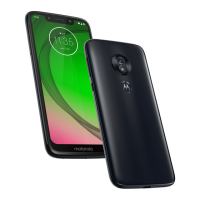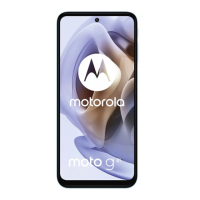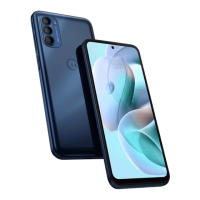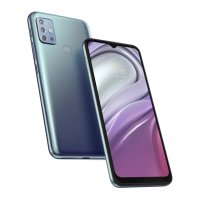Do you have a question about the Motorola moto g04s and is the answer not in the manual?
Understand the elements of the home screen and how to add/remove screens.
Learn what you can do from the lock screen, including emergency calls and quick settings.
Guidance for new smartphone users, covering apps, phone protection, and personalization.
Monitor and understand your phone's data usage and adjust settings to conserve data.
Learn to use tap, drag, swipe, and pinch gestures for navigation and interaction.
Switch between apps and screens using gesture or 3-button navigation.
Open and adjust frequently used settings like Wi-Fi, Bluetooth, and brightness.
Learn to turn the screen off and on manually using buttons or gestures.
Follow instructions to properly shut down the phone.
Turn the flashlight on/off using quick settings or a chopping motion gesture.
Use the camera to scan QR codes and access linked information.
Use the Sound Recorder app to record, listen to, and manage audio notes.
Open camera, take photos, adjust settings like flash, focus, and exposure.
Capture screenshots using various methods and edit or share them.
Record videos using the camera, including timelapse and selfie modes.
Share photos and videos wirelessly via email, messages, cloud, or Bluetooth.
Back up photos and videos automatically or manually to Google Photos.
Turn on Wi-Fi and connect to available networks, including hidden ones.
Turn off wireless connections to comply with airline regulations.
Manage mobile data, set warnings/limits, and restrict background data.
Set up Wi-Fi hotspot or USB/Bluetooth tethering to share internet.
Set up a VPN connection for secure access to networks.
Turn Bluetooth on/off and pair with Bluetooth devices.
Set up and use NFC for secure contactless payments.
Share content between devices securely using NFC.
Share content easily and securely with nearby devices using Quick Share.
Connect phone to computer via USB cable to transfer files.
Select USB modes like File transfer, tethering, or charging.
Mirror screen or cast app content to a TV using Chromecast or compatible smart TVs.
Set screen brightness manually or use adaptive brightness.
Switch to dark theme for reduced eye strain and battery saving.
Adjust text and icon sizes for better readability and screen comfort.
Select refresh rate for smoother motion or better battery life.
Set apps to use full screen, stretching across the display.
Prevent or allow screen rotation based on phone orientation.
Schedule screen to amber or grayscale to reduce eye strain at night.
Adjust color intensity and temperature for a realistic or enhanced look.
Set the inactivity time before the screen turns off automatically.
Control Glance content, notifications, clock size, and lock screen messages.
Monitor and control smart home devices directly from the lock screen.
Configure screen to wake automatically when picking up phone or receiving notifications.
Use volume buttons to adjust media, ringtone, notification, and call volumes.
Change default call ringtone and set custom ringtones for contacts.
Set default or specific app notification sounds and volumes.
Turn vibration on/off for calls, notifications, and alarms.
Use Do Not Disturb to mute ringtones and notifications, with scheduling options.
Customize sound profiles for music playback using Dolby Atmos.
Control notifications for individual apps or all apps.
Manage notification dots, bubbles, and snoozing for better notification handling.
Set apps to open in freeform from notifications for multitasking.
Configure phone to flash camera light or screen for notifications.
Adjust notification volume and set default or specific app notification sounds.
Control which apps can read your notifications and stop them from accessing them.
Enable and view notification history to see cleared or snoozed notifications.
Enable and customize the sidebar to quickly open apps in a small window.
Choose between gesture navigation or 3-button navigation.
Enable one-handed mode for easier thumb navigation and control.
Enable tapping gestures to turn the screen on or off.
Customize screenshot capture methods and gestures.
Configure actions for double-pressing or pressing & holding the Power button.
Learn about screen lock options, fingerprint sensor, and additional security measures.
Scan phone for malware using Play Protect and uninstall harmful apps.
Use Find My Device to remotely locate, lock, or erase your phone.
Set up a pattern, PIN, password, or face unlock for phone security.
Use Lockdown mode to temporarily disable fingerprint and notifications on lock screen.
Enable fingerprint recognition for secure sign-in to third-party apps.
Keep an app in view until unpinned, preventing navigation to other screens.
Adjust app permissions for accessing data and phone features.
Block mic or camera access for apps individually or for all apps.
Configure SOS to call responders, send location, and record video in emergencies.
Enter emergency contact and medical info for lock screen viewing.
Enable ELS to send location to responders during emergencies.
Control public safety alerts for weather and other emergencies.
Change phone display language and set app languages.
Add languages, resize, change appearance, and adjust sounds/vibration.
Adjust RAM boost settings to open apps faster and multitask smoothly.
Automatically or manually back up phone data to Google account and Drive.
Set up user profiles, guest sessions, and screen pinning for phone sharing.
Add, modify, remove, and restrict calls/messages for user profiles.
Create, lend, and end temporary guest profiles for phone sharing.
Find and record your phone's IMEI number for support and security.
View regulatory labels, safety, warranty, and model information.
Keep phone updated with latest Android software for performance and security.
Reset network settings, app preferences, or baseband settings to resolve issues.
Erase all data and reset the phone to out-of-the-box condition via Settings.
Perform an external reset using hardware buttons if Settings is inaccessible.
Find help for issues via carrier, app help sections, or Motorola support.
Provide comments and suggestions about the phone or Motorola apps.
Steps to fix phone slowness, including restarting, checking updates, and storage.
Understand reasons for phone warmth and ways to keep it from heating up.
Steps to fix issues with the phone not starting, showing a blank screen, or turning off.
Steps to fix random reboots, restarts, or shutdowns.
Steps to unfreeze the screen, including restarting, checking updates, and factory reset.
Fix issues with grayscale, negative colors, or incorrect color tones.
Steps to fix issues when the phone doesn't recognize a new SD card.
Check card compatibility and try formatting using a computer.
Steps to fix issues when the phone stops reading the SD card.
Select the best description of your call issue to find troubleshooting steps.
Fix issues like missing phone icon, SIM card not recognized, or no signal.
Steps to resolve issues when you have signal but cannot make calls.
Address outbound and incoming calls that consistently result in a busy signal.
Check volume, Do Not Disturb, ringtone settings, and Bluetooth connections.
Check Do Not Disturb settings, schedules, and Bedtime mode.
Check case, cover, proximity sensor, and safe mode for screen issues.
Check signal strength, restart phone, and check software updates.
Check microphone obstruction, Voice privacy, and signal strength.
Steps to fix problems with charging, including USB plug, outlet, and charger checks.
Understand normal phone warmth during charging and when to contact support.
Fix issues with TurboPower charger not working correctly, especially at higher battery levels.
Reboot phone and check settings to extend battery life if it drains faster than expected.
Steps to fix problems pairing with Bluetooth devices, including discovery mode and updates.
Connect to previously paired Bluetooth devices.
Check volume, media audio, phone audio, and device pairings for music playback issues.
Check other devices, phone audio settings, and car instructions for call problems.
Fix connection drops by checking battery, adjusting positioning, and clearing app data.
Fix problems connecting to Wi-Fi networks by checking password, router firmware, and phone reset.
Resolve Wi-Fi drops by turning off scanning, removing networks, and restarting router.
Fix issues with turning on hotspot, connecting devices, or accessing websites.
Check computer settings, phone software updates, and USB connection for file transfer issues.
Steps to recover your phone if you forgot your PIN, pattern, or password.
Resolve issues signing into your Google account, including password resets and waiting periods.
Fix sync problems by checking auto-sync, internet connection, and account status.
Add missing widgets or app shortcuts, or reinstall apps that disappeared.
Turn off app suggestions to prevent automatic replacement of favorite app icons.
Fix apps that crash, won't open, or aren't working by checking permissions, updates, cache, or safe mode.
Exit safe mode to re-enable disabled apps.
Resolve apps stuck in 'Pending' status by updating Chrome first.
Check for updates, clear cache, or visit developer website for app support.
Fix blurry photos by cleaning lens, increasing resolution, avoiding zoom, or switching modes.
Attempt to recover deleted photos and back them up to the cloud.
Check SD card or use Files app to delete photos if they reappear.
Fix problems with taking photos or videos in WhatsApp by checking updates or cache.
Resolve camera errors by restarting phone, checking updates, or using safe mode.
Empty the trash in the Photos app to resolve messages about the trash being full.
Fix unsent text messages by checking signal strength and resending.
Check Do Not Disturb settings and message notification settings.
Change preferred network, deregister iMessage, or contact carrier for messaging issues.
Check cellular data and MMS support for sending/receiving multimedia messages.
Fix Messages app issues by checking permissions, force stopping, clearing cache, or resetting phone.
Fix keyboard issues like missing spacebar by checking updates, restarting, or clearing cache.
Fix problems with installed messaging apps by checking updates, clearing cache, or restarting.
Refer to Google's troubleshooting information for help with Gmail.
Refer to Google's troubleshooting information for help with the Play Store.
View the current Android version running on your phone.
Install available Android software updates for performance and security improvements.
Reset Wi-Fi, cellular data, and Bluetooth connections to resolve network issues.
Reset all app preferences to default settings if experiencing app issues.
Reset phone's mobile network connections to resolve signal or data issues.
Back up data and ensure security information is known before performing a factory reset.
Erase all data and reset the phone to out-of-the-box condition via Settings.
Perform an external reset using hardware buttons if Settings is inaccessible.
Find help for issues via carrier, app help sections, or Motorola support.
Provide comments and suggestions about the phone or Motorola apps.
| Resolution | 720 x 1600 pixels |
|---|---|
| Processor | Unisoc T606 |
| Main Camera | 50MP |
| Front Camera | 5MP |
| Battery | 5000 mAh |
| Operating System | Android 14 |
| Network | GSM / HSPA / LTE |
| Fingerprint Sensor | Side-mounted |
| RAM | 4GB |
| Storage | 64GB |
| Colors | Black, Blue, Green |
| SIM | Dual SIM (Nano-SIM, dual stand-by) |
| Bluetooth | 5.0 |
| USB | USB Type-C 2.0 |
| Audio Jack | 3.5mm |
| Display | 6.6-inch (16.66cm) IPS LCD |











